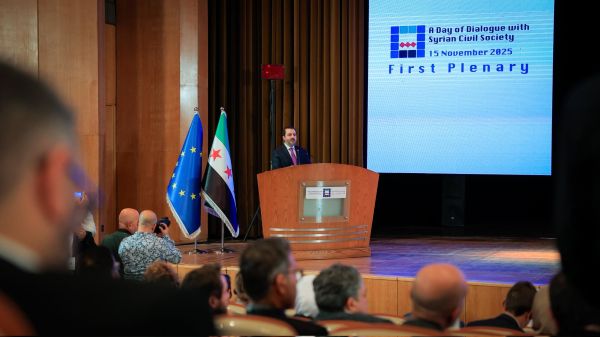On Saturday, representatives from Syria’s civil society engaged in significant open discussions in Damascus, attended by officials from the European Union and the transitional government. These discussions addressed critical issues such as sectarian tensions, ethnic divisions, and the impacts of violence among various factions.
Known as “The Day of Dialogue,” these EU-organised meetings marked a historic first for such events in Damascus. Traditionally held during the annual Brussels Conference on Syria, the ‘Day of Dialogue’ serves as an interactive platform for civil society organisations and NGOs involved in Syria and the broader region to share perspectives, exchange experiences, and inform the policies that direct international support.
“After decades of brutal dictatorship, Syria now has a chance to rebuild the country in a way that reflects the will of the Syrian people. A safe, independent, and vibrant civic space is an essential part of this process. Today’s event allows Syrians to express their opinions about the future of their country and have their voices heard. EU support for Syria is not just in words but also in deeds. The EU is providing 2.5 billion euros in aid to help the country rebuild,” said High Representative/Vice-President Kaja Kallas.
The meeting occurred nearly a year after the unprecedented fall of the 54-year Assad family rule in Syria, resulting from a significant offensive by insurgent groups in early December. The Assad government had predominantly boycotted previous gatherings associated with the Brussels Conferences. The European Union confirmed that Saturday’s discussions were held in cooperation with both Syrian civil society and the Syrian transitional authorities.
In his opening remarks at the conference centre situated in the southern outskirts of Damascus, Foreign Minister Asaad al-Shibani emphasised the importance of this shift towards dialogue. He described the meetings as indicative of a “solid partnership with civil society and our partners in the European Union.”
Michael Ohnmacht, the chargé d’affaires of the EU delegation to Syria, noted the participation of 500 individuals from diverse religious and ethnic backgrounds, stating that “this is an encouraging development.” He expressed his aspirations for a future Syria characterised by inclusivity and representation for all citizens.
Despite recent political changes, sectarian violence continues to be a troubling reality. In March, there were violent incidents in the coastal region, and similarly in July in the southern province of Sweida, which led to hundreds of casualties among pro-government gunmen and members of the Druze and Alawite minorities. These events underscore the ongoing challenges facing Syria amid a 14-year conflict that has resulted in significant loss of life.
“Today’s dialogue represents the beginning of a transformative process, and the rebuilding of Syria will rely on partnerships founded on mutual respect between the state and civil society,” remarked Social Affairs Minister Hind Kabawat. During discussions focused on transitional justice and the plight of the missing, participants raised critical concerns regarding unresolved cases, notably the over 130,000 individuals who have been reported missing under Assad’s regime. An ethnic Kurd shared personal experiences of persistent discrimination, while other voices highlighted the violence faced by women from minority sects.
Mazen Darwish, a well-respected Syrian lawyer and activist who has endured imprisonment before his exile, conveyed that there are no regrets regarding the fall of the Assad family rule. However, he recognised that this change does not guarantee an uncomplicated or prosperous future for Syria. He urged participants, stating, “Today presents a valuable opportunity for Syria that we must embrace.”
This article used information from The Associated Press.

